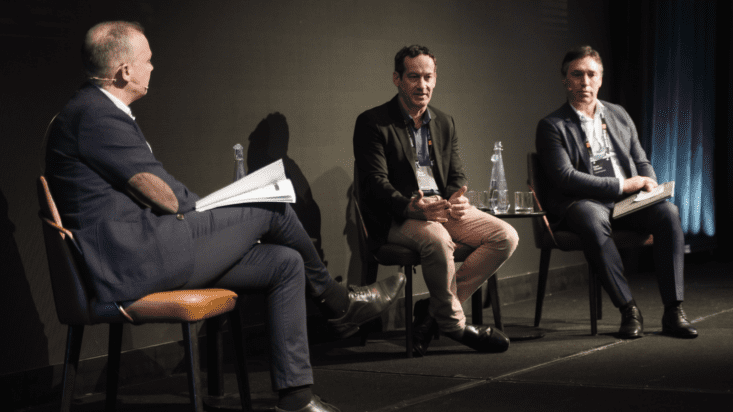Nextgen property funds bringing a new factor into the equation: Certainty
While the Australian residential and commercial property markets are some of the hottest in the world right now, the channels to enter it are typically limited to direct purchases that require relatively large capital outlay, or real estate investment trusts (REITS) that take an often blunted, broad-based investment approach.
A new generation of investment funds have cropped up, however, that are looking at real estate investment through an entirely different prism and passing that fresh outlook onto investors.
Speaking at The Inside Network’s Income and Defensives Symposium in Sydney, Brickfloor’s Dean Fraser (pictured, centre) explained the genesis of the group’s product suite, which hinges on both the front and back ends of residential property sales. It’s within the front end, however, that the real innovation lies. That point when someone is deciding whether to sell first before buying, or vice versa… that’s where Brickfloor steps in.
“It’s one of life’s most stressful events,” Fraser said. “There is so much emotional and financial friction around selling a home, so we developed a product to solve that core selling issue.”
That product is called a “market price guarantee”, which effectively gives 100 per cent sale certainty to a seller.
“We lock in a floor price for that seller. They take the home to market and try to achieve a higher price. If they can’t, we step in and we buy that home into a property fund,” he explained. “We’re buying homes at what we feel to be around three to five per cent below what we think the home is actually worth, but effectively it’s the floor price that that seller is happy with.”
The concept not only gives sellers a backstop so they know they’ll get a reasonable sale on their home and can focus on buying a new property, but allows Brickfloor to purchase a “large platform of homes” at marginally under-market prices and create an income-generating fund on the other side of the product equation.
“We’re not talking about apartments or new builds, it’s effectively making investment in established houses available to everyone, including retail investors, financial advisers and ultimately institutional providers,” he said.
Alongside Fraser at the event, Capital Prudential’s Samuel Moore (pictured, right) explained how his group was giving investors another alternative to typical property development projects.
“How do we move away from traditional investment in property development, which is generally under a property syndicate-type arrangement, where an investor will come in for a targeted but uncertain return, and a targeted timeframe, and then they’ll be exposed to a single asset and a single geography, a single builder, a single point in the property cycle and a single point out?” he asked.
“How do we provide that to investors who wouldn’t otherwise access it? How do we provide access to them and deliver the returns entirely as income… regular, predictable income, rather than the uncertain returns that I talked about?”
Capital Prudential not only takes the capital outlay issue out of the hands of investors, he said, but also gives them a certain income based on a diversified portfolio of mid-scale commercial and residential property developments.
“The capital doesn’t have a high correlation to bond yields or credit markets,” he added. “And the returns are fixed and so you know what we’re delivering to investors in terms of their expected return equates to their actual return as well.”











